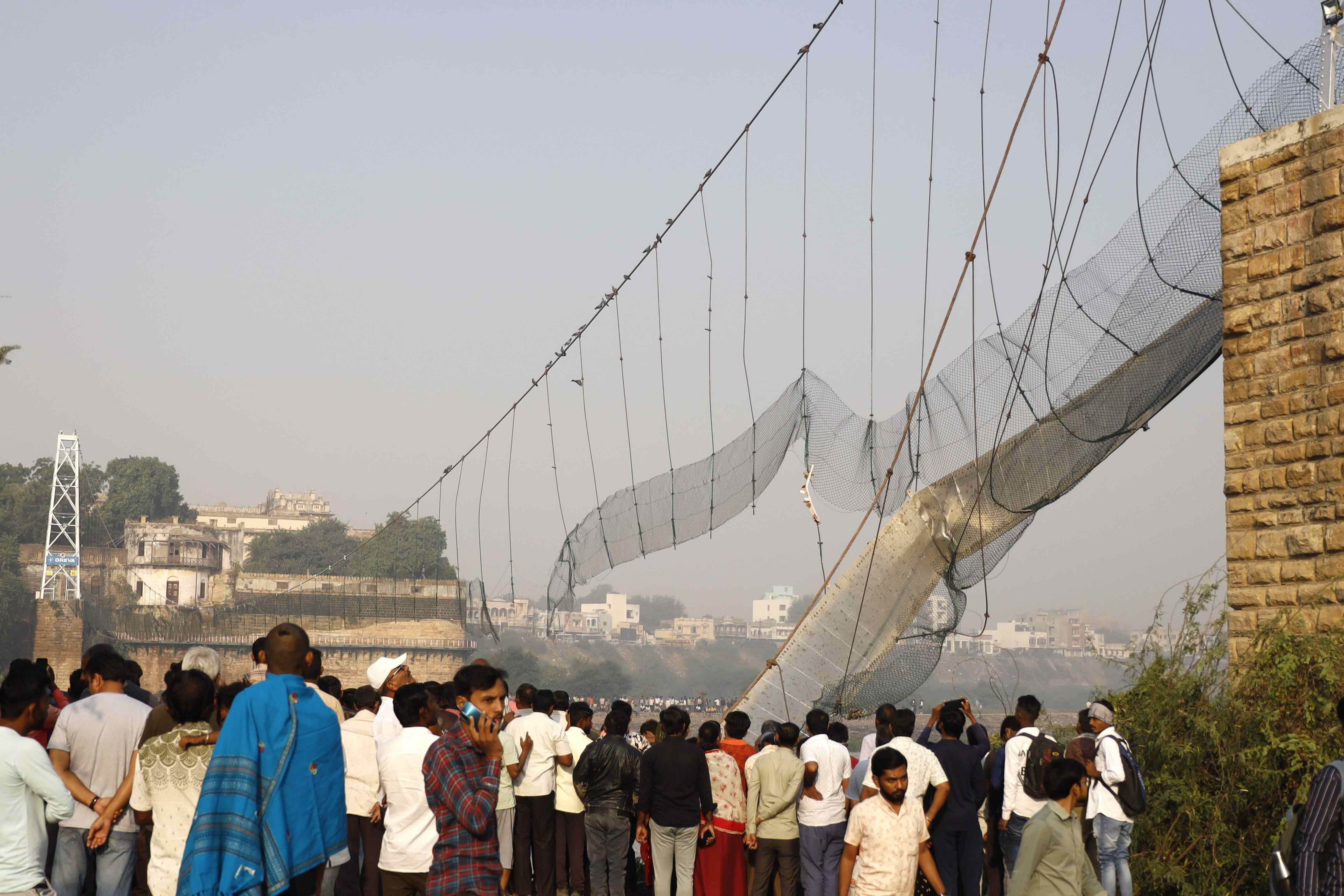Man-made tragedy
Yet another bridge collapse shocks the nation showing no lessons have been learnt from the past

How do tragedies happen? Negligence, corruption, and most definitely, created by man. The Morbi bridge collapse wiped out families, lives, and futures. A shocking incident caught on video giving goosebumps as one watches the imminent collapse. Cries of horror, pleas for help engulfed the century-old suspension bridge. The incident has left over 135 people dead of the 400 who plunged into the Machchu river. Only shreds of the torn safety net, cable ties, tickets remain, and an eerie silence that shrouds the area with a deathly pall.
We hear stories of escape, of newly-weds and children dying, chance survivals, generations annihilated, and brave rescues. The heartrending tales keep tumbling out of lives snuffed out much before their time. The tourist spot in Gujarat colloquially called 'Jhulto Pul' (hanging bridge) turned into a death trap for so many. And why? Just because of the irresponsible, callous, and criminal behaviour of the contractors. Just five days before the incident, this foot bridge had reopened after repairs. It had stayed shut for six months for renovation but news reports claim that the repairs were an eyewash and that no actual work had been done.
Instances of serious lapses are now being reported. The lack of a structural audit, use of material that increased the weight of the bridge, and reopening without a final fitness certificate from the municipal authorities are being cited. Ticketing clerks that allowed overcrowding, a complete mismanagement of the bridge, as well as ill-preparedness to handle any emergencies — there is much mud-slinging doing the rounds. The cables may not even have been changed, just polished and painted! And a video of the Ajanta-Oreva Group chairman speaking to local media stating that the bridge would be fine for 8-10 years, seems a cold-blooded affirmation. The way in which the Oreva Group, which apparently has no prior experience in public safety, received the maintenance contract is also being questioned. No tenders or bids were issued, and there is no transparency in awarding the contract to the company.
The fact that this catastrophe happened in one of India's most industrialised states is equally surprising. Gujarat has been steadily attracting big industries for over a decade, and takes pride in its infrastructural development. Many unanswered questions remain — how were municipal authorities unaware of the reopening of the bridge, why was overcrowding allowed at a ticketed site, why was the bridge reopened much before its deadline, who are these sub-contractors that carried on the alleged repairs, why were there no experts involved to give the final sign-off?
The Morbi bridge collapse, though one of the deadliest, is not the lone one in recent Indian history. A news report cites the following — the Darjeeling bridge collapse of 2011 that killed 32 people and a week later in the same year, a footbridge in Arunachal Pradesh also broke down killing 30 people. Five years later in 2016, the Vivekananda bridge collapsed in Kolkata killing 26 people, Majerhat flyover (also in Kolkata) caved in 2018 killing 3, and a Mumbai footbridge fell killing 6. This chronology of tragedies proves that no lessons were learnt from previous events. And if government authorities don't become strict, the Morbi bridge collapse may not be the last. As per the 'Analysis of bridge failures in India from 1977 to 2017', carried in an overseas journal, 'Structure and Infrastructure Engineering', in 2020, there are 2,130 bridges that are literally tottering in the country. Another news report says that almost 6 people die on an average every day due to structural collapse!
Why are lives in India so cheap? Why don't we take maintenance seriously? Are one-time, paltry government compensations adequate to replace the familial, social, and monetary contributions that would have been made by a living being? Heads should roll, accountability of maintenance of old structures needs to be fixed, and dereliction of duty cannot go unpunished. Only then, can we stop these man-made tragedies. And it's not an 'act or will of God', a phrase used loosely by contractors and governments to cover up human folly and corruption. Bridges fall when humans fail.
The writer is an author and media entrepreneur. Views expressed are personal



